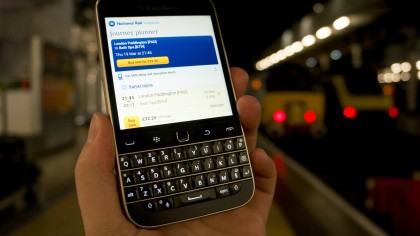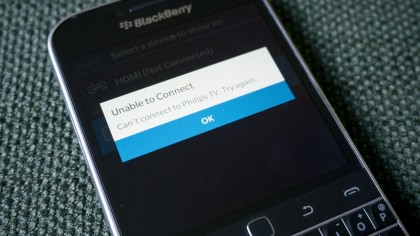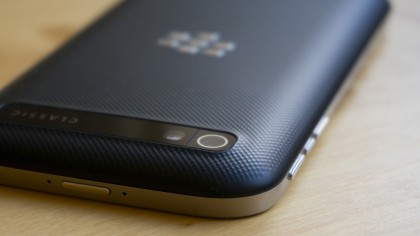Can an Apple addict break the habit of a lifetime and switch to BlackBerry?
This isn't a new problem, sure; anyone who has switched from one platform to another knows that although our increasing reliance on the cloud means that transitions are eased, there is pain as you adapt your workflows, work out where you are in the system, and tool up with power-user tricks.
For some, the fact that there's an official Twitter app, say, will be enough, but these official apps tend to stagnate outside iOS and Android, and for me 'a' Twitter app is no substitute. I sorely missed Tweetbot, not just because of how it works on my iPhone but because it syncs my place and mute lists to my Mac and iPad as well.
There's also the issue of trust. Over years, I realised, I've internalised a lot of trust in certain apps, or at least know where their weaknesses are. Famously, Apple Maps was at least a PR disaster, but through use I learned that while its POI lookup was atrocious, its routing when driving could be trusted. When I was using the Classic on a long trip, and it spun me off the motorway around Birmingham – presumably to avoid congestion – I had no idea if I should trust its advice.

And to be sure, I missed some of the Apple-ecosystem-only apps, such as iMessage and Find My Friends; I use the latter, for example, to be alerted when my wife arrives at the train station so I can drive to collect her, and we had to resort to making green-bubble SMS arrangements like cavemen.
The bigger ecosystem problem, though, and the one I hadn't anticipated, was the extent to which everything's becoming interconnected, with the smartphone at the centre. I use my iPhone to control my home cinema set-up using a Logitech Harmony system, I use my iPhone to control the Philips Hue lights in my living room, I use my iPhone to check Netgear security cameras when I'm out of the house for a long time, and I can transfer shots from my Sony NEX-5T over Wi-Fi to my iPhone.
None of these are supported by BlackBerry – neither natively or using its kludgy-but-effective workaround of emulating Android apps sold through the Amazon Appstore. Not only are they supported on iOS but most are being actively developed. (Some things were okay; I could install the app for my Wi-Fi scales, for example.)
I am probably in the minority, having so many 'Internet of Things' devices around. But I'm also probably in the vanguard too, and it becomes a self-fulfilling prophecy; as more IoT things are made and bought, which understandably target the most successful platforms, the more the less-popular platforms wither.
Sign up for breaking news, reviews, opinion, top tech deals, and more.
One solution is vendor-agnostic standards, but they didn't help me. The BlackBerry Classic, of course, doesn't support Apple's wireless streaming system, AirPlay, but my TV has Miracast built in; it refused to work with the Classic, however. And there you have the problem with vendor-agnostic standards writ large – they're fragile. And I have no problem 'admitting' that a big appeal of an Apple ecosystem is that I'm lazy, and that by-and-large Apple stuff works together better and more smoothly than anything else. To paraphrase my colleague Chris Brennan, you might be stuck in a walled garden, but hey; a walled garden is a pretty nice place to be.

What I'm left with, then, is a feeling of frustration on BlackBerry's behalf that its market share is so catastrophic. Sure, it was slow to react, and yes, an accusation of early hubris and arrogance about the market that, after all, it served to create may well be fair.
But there's nothing drastically wrong with BlackBerry 10 (the OS), and the BlackBerry Classic hardware is, to my eyes – and fingers – quite lovely, in a pinstripe, explicitly techy and masculine kinda way. It's a good phone, and in a parallel universe I'd be delighted with it.
Yet the SIM's going right back in my iPhone, not because it is orders of magnitude better than the Classic, but because it turns out that smartphones – more so than ever was true of desktop or laptop computers – sit at the centre of and mediate between a vast, shifting galaxy of other devices and services. In order for that to work, they need people to be making those things talk to them, not even necessarily as official partners, but just because it's cool and because people have them.
In the era of the computer that sat on your desk or on your lap, and of the dumb or feature phone that nestled in your pocket, all a company had to do to succeed was make the thing it was selling good. Today, that's just the first step, and tomorrow they're going to be even more reliant then ever on others for their success.
That's why I'm sad for BlackBerry as a phone maker, because the now-accepted narrative about its slide into irrelevance will mean its ecosystem further stagnates. And of course sentences like that don't do anything to help matters.

I'm going to keep using my iPhone, and I can't currently foresee a time when I won't use an iPhone. Not just because they are good phones but because Apple's massive cultural dominance in technology is likely to mean that the cool apps, the groundbreaking services and the intriguing hardware ecosystems are all going to work on iOS, even if only at first. That's exciting.
But I'm going to keep the BlackBerry on my desk. I'm going to pick it up from time to time. I'm going to run my thumb over its scaly keys. And I'm going to think about how sad it is that all smartphones today are indistinguishable rectangles of glass.